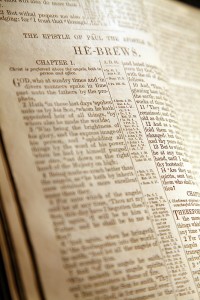According to Jeremiah 31, the new covenant will be made after YHVH has gathered (or redeemed, v. 11) all the families of Israel (v. 1; i.e., the houses Ephraim or Israel [i.e., Christians] and Judah [i.e., the Jews], vv. 9, 20, 27, 31) who will be returning from the north country, the coasts of the earth and the isles (vv. 8, 10) back to Zion with joy, singing and dancing (vv. 12–13, 24). This will occur after Ephraim repents (v. 20) of Torahlessness, and YHVH’s daughter turns away from her backsliding (vv. 21–22), and upon coming out her captivity in the end times (v. 23; in spiritual Egypt or Babylon the great). At that time, YHVH will make a new covenant with the two houses of Israel (vv. 31–33), and all Israel will know Elohim from the least to the greatest. This prophecy has yet to be fulfilled.
after YHVH has gathered (or redeemed, v. 11) all the families of Israel (v. 1; i.e., the houses Ephraim or Israel [i.e., Christians] and Judah [i.e., the Jews], vv. 9, 20, 27, 31) who will be returning from the north country, the coasts of the earth and the isles (vv. 8, 10) back to Zion with joy, singing and dancing (vv. 12–13, 24). This will occur after Ephraim repents (v. 20) of Torahlessness, and YHVH’s daughter turns away from her backsliding (vv. 21–22), and upon coming out her captivity in the end times (v. 23; in spiritual Egypt or Babylon the great). At that time, YHVH will make a new covenant with the two houses of Israel (vv. 31–33), and all Israel will know Elohim from the least to the greatest. This prophecy has yet to be fulfilled.
The author of Hebrews quotes Jeremiah 31:31–33 (Heb 8:7–13) asserting that the new covenant is the same covenant about which Jeremiah prophesied. From that author’s perspective (Heb 8:13), the new covenant isn’t fully in place yet, and the first covenant is decaying (wearing out), growing old and vanishing away (disappearing). The implication is that the old covenant has not totally gone away yet (see also 2 Cor 3:11).
We know that Yeshua initiated the new covenant at his Passover seder called the last supper (Luke 22:20). This covenant has been given to believers in Yeshua, but it hasn’t been universally applied to all Israel yet. This will occur when the two houses of Israel will return to the Promised Land after they have been set free from spiritual Babylon at Yeshua’s second coming.
YHVH’s Word tells us that no man can add to or subtract from the terms of the old covenant (Gal 3:15). Although YHVH made this covenant with men, it is a divine covenant, and YHVH himself (not men) determines its terms and conditions! When Yeshua initiated the new covenant at his Passover, the old covenant and the Torah were still in force, and not one jot or tittle will be removed from the Torah until heaven and earth pass away (Matt 5:18). The Torah determines the terms of both the old and new covenants. Any traditions that have come into the Christian (Sunday, Christmas, etc.) or Jewish religious systems that are contrary to the Torah are men’s additions, and are therefore invalid and irrelevant.
Even as there was a gradual process of phasing into the first (or old) covenant, the same is true of the new covenant. With the former covenant, the Israelites put the blood of the lamb on their door posts at Passover, prepared themselves to meet YHVH at Mount Sinai (Exod 19), were then presented with the terms and conditions of the Sinai covenant at Shavuot (Exod 20–23), and then the covenant was ratified (Exod 24). After that, subsequent generations of Israelites automatically entered into that covenantal agreement as they were born (Deut 29:12–15) even as Americans, for example, are still bound to the U.S. Constitution many generations after its ratification.
Similarly, Yeshua initiated the new covenant with Israel in his day when his blood was put on the door posts (the cross) at Passover, then wrote his Torah (the terms and conditions of the new covenant) on their hearts by his Spirit on Pentecost. This began the process of regathering scattered and adulterous Israel back to YHVH through the blood of Yeshua the Lamb of Elohim.
When the process of regathering Israel is finally completed (during the Millennium). YHVH will finalize his new covenant agreements with them. It will be called the everlasting covenant (Jer 32:40; Ezek 37:26; Isa 55:3) or the covenant of peace (Isa 54:10; Ezek 34:25; see also 59:10; Hos 2:19–19).






